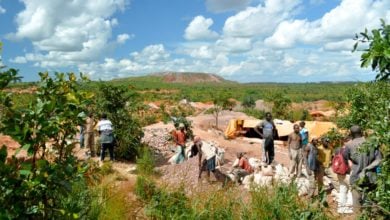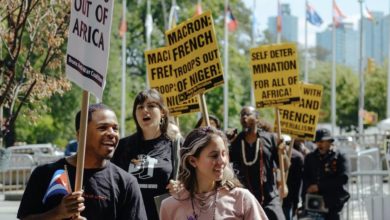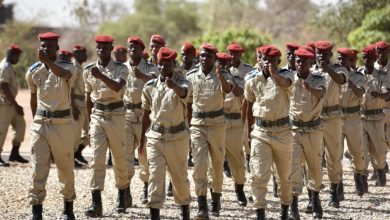For the last several years, the U.S. armed forces and armies of other North Atlantic imperialist countries have sought to establish a permanent military presence in West Africa. The motive is to establish client states in the region that can secure strategic natural resources and promote Western military and corporate interests.
 Opposition supporters react to election results. |
Whether under the cover of “humanitarianism” or the “war on terrorism,” the aim of militarization is to guarantee unrivaled access to West Africa’s resources and to police uncooperative peoples or governments. Now, North Atlantic imperialists are seizing on a political crisis in the Ivory Coast in order to consolidate their strategic foothold in the region.
The Ivory Coast entered a potentially violent political crisis this month when incumbent President Laurent Gbagbo refused to step down after a constitutional court rejected the results of the electoral commission, which declared his opponent, Alassane Ouattara, the legitimate winner. France, the United States and the West African regional bloc, the Economic Community of West African States, have called on Gbagbo to step down, asserting that former International Monetary Fund official Ouatarra is the country’s new president.
Ouatarra and Gbagbo each claim to be the legitimate president of the country. In response to the impasse in Ivory Coast, the United States and France have ratcheted up their rhetoric against President Gbagbo and pushed ECOWAS to intervene if he does not step down. They even pressed for expanding the United Nations “peace-keeping” forces to scare Gbagbo into conceding.
Gbagbo, who still controls the military and police forces and maintains popular support in some quarters, has warned that civil war could break out if foreign militaries try to force him from power. Nevertheless, neither side has yet backed down and talk of a power-sharing agreement is being opposed by the United States, supposedly in defense of “democracy.”
It would take a giant leap of faith to believe that the U.S. government was a credible voice on democratic rights in Ivory Coast, or anywhere else for that matter. After all, this is the same Obama administration that supported the fraudulent colonial election process in Afghanistan in 2009, which re-elected the corrupt U.S. puppet, Hamid Karzai.
Election monitors and human rights groups widely condemned the rigging of elections in Afghanistan, only to have President Obama and Chairman of the Joint Chiefs of Staff Adm. Michael Mullen ardently defend the results. Even former President Jimmy Carter proclaimed that “Hamid Karzai has stolen the election,” and “now the question is whether he gets away with it.” Not only did Karzai get away with it, he did so with the assistance of the U.S. military and State Department.
The utter contempt of the United States for the democratic process in Afghanistan exposed the colonial nature of the occupation in South Asia; likewise, it is the opportunistic defense of Ouatarra in Ivory Coast that reveals the true imperialist ambitions in West Africa. The “democratic” theme is only invoked in cases where the North Atlantic countries consider their strategic interests threatened.
The militarization of Ivory Coast is part of a long-term strategy by the imperialists to counter the growing cooperation between China and African nations whose leaders the United States would like to overthrow. Leaked cables sent to Wikileaks quote the U.S. Assistant Secretary of State for African Affairs Johnnie Carson labeling China as a “pernicious economic competitor,” adding that the United States had two “trip wires” against China’s presence in Africa.
“Is China developing a blue-water navy? Have they signed military base agreements? Are they training armies? Have they developed intelligence operations?” he said. (Al Jazeera, Dec. 9)
The United States and its North Atlantic allies are beginning a massive military buildup to gain a strategic advantage in West Africa over China. In addition, imperialists see the effort to “to push democracy and capitalism,” in the words of the leaked cables, as key to maintaining their influence in the region.
Regardless of who “won” the disputed elections in Ivory Coast, the majority of the people continue to wrestle daily with poverty, unemployment and social conflict. An election can be a significant event but it is not the panacea Western capitalist countries promote it to be. The conditions of life for the majority of Ivorians will change only when the country undergoes a fundamental transformation of society and the creation of a nationally united state that will obey the needs of people rather than foreign corporations and comprador elites.
In the meantime, progressives should stand with the African left, saying to imperialist powers, “Hands Off the Ivory Coast!”





